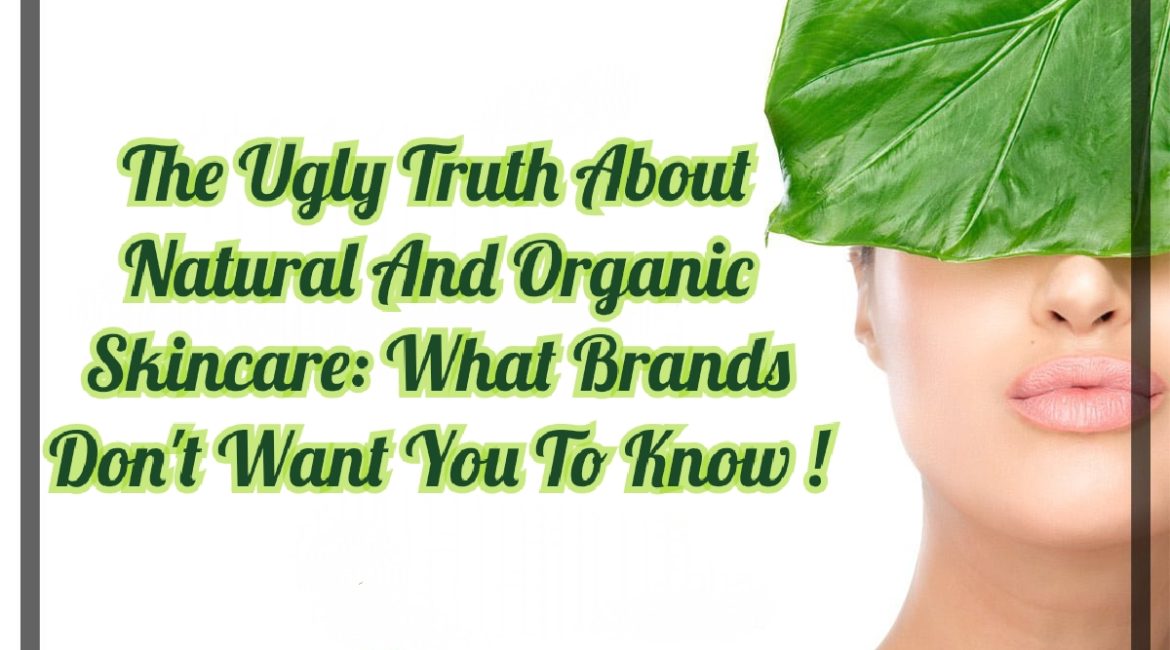In recent years, “natural” and “organic” skincare products have become buzzwords in the beauty industry, promising purity, safety, and environmental consciousness. Many consumers assume that these products are inherently better for their skin and the planet, but the reality is more complicated. While there are undoubtedly benefits to choosing natural ingredients, the marketing behind these terms often conceals a few ugly truths. Here’s what brands don’t want you to know.
1. “Natural” and “Organic” Labels Are Loosely Regulated
One of the biggest misconceptions is that the terms “natural” and “organic” are tightly regulated. In reality, the skincare industry operates with a lot of grey areas when it comes to labelling. Many countries, including the United States, do not have strict guidelines that clearly define what makes a product “natural” or “organic.”
For instance, a product can be labelled “organic” even if only a small percentage of its ingredients are truly certified organic. Likewise, “natural” products can still contain synthetic chemicals, as long as they include some plant-derived components. This leaves room for brands to market their products as clean or eco-friendly, even when they may not live up to these ideals.
2. Natural Doesn’t Always Mean Safe
There’s a common belief that natural ingredients are always safer or gentler than synthetic ones. However, nature is full of allergens, irritants, and potent chemicals that can cause reactions in sensitive skin. For example, essential oils like lavender or tea tree oil are often marketed as natural alternatives to synthetic ingredients, but they can still cause allergic reactions or skin sensitivities in certain individuals.
Many consumers assume that if a product is plant-based, it must be harmless. But just because something is natural doesn’t mean it’s automatically good for your skin. Poison ivy is natural, too, but you wouldn’t want it in your skincare routine!
3. Organic Farming Isn’t Always Better for the Environment
Organic farming practices are often marketed as being more sustainable and environmentally friendly than conventional farming. While it’s true that organic farming avoids synthetic pesticides and fertilizers, it doesn’t automatically mean it has a lower environmental impact. Organic farming often requires more land to yield the same amount of crops as conventional methods, which can lead to deforestation or other environmental harm.
Moreover, the carbon footprint of shipping exotic organic ingredients from halfway across the world may outweigh the environmental benefits of those organic practices. In the end, it’s crucial to look beyond the organic label and consider the bigger picture of sustainability.
4. Greenwashing Is Rampant in the Industry
The rise of conscious consumerism has led to the marketing phenomenon known as “greenwashing,” where brands exaggerate or mislead consumers about the environmental benefits of their products. Many skincare brands use green or earthy packaging, floral imagery, and terms like “pure” or “clean” to give the illusion that their products are eco-friendly, even if they contain questionable ingredients.
Some companies even use the tactic of “green sheens,” where they highlight one natural or organic ingredient prominently on the packaging, while hiding the fact that the rest of the product is full of synthetics, preservatives, and harsh chemicals. This deceptive marketing preys on consumers who are trying to make responsible choices, leading them to believe they’re purchasing something more ethical than it really is.
5. Preservatives Are Often Essential for Safety
One of the biggest draws to “natural” skincare is the idea that these products are free from harmful chemicals like parabens and synthetic preservatives. However, what brands don’t tell you is that preservatives play a crucial role in keeping skincare products safe to use. Without preservatives, natural products can spoil quickly, leading to the growth of bacteria, mold, and yeast, which can cause infections or skin irritations.
Many so-called preservative-free products still need to be stabilized in some way. Some brands opt for “natural” preservatives like grapefruit seed extract, which sounds appealing but may not be as effective as synthetic options. Ironically, these “natural” preservatives often need synthetic additives to make them work, bringing us back to the issue of misleading labels.
6. The Allure of Exotic Ingredients May Be Overrated
Exotic ingredients like acai berries from the Amazon or Argan oil from Morocco are often touted as miracle ingredients in natural and organic skincare products. While these ingredients can indeed have beneficial properties, the reality is that the same results can often be achieved with more common, less expensive alternatives. The allure of these exotic ingredients can be more about marketing than actual skincare benefits.
Moreover, the demand for these ingredients can have unintended consequences on local ecosystems and economies, leading to over-harvesting, exploitation of local labour, or environmental degradation.
7. Price Doesn’t Always Reflect Quality
Many consumers equate higher prices with better quality when it comes to natural and organic products. However, just because a product is expensive doesn’t mean it’s more effective or safer. In fact, many luxury skincare brands use the same marketing tactics and vague labelling as their more affordable counterparts, with no real difference in the efficacy of the product.
What you’re often paying for is the brand name, the packaging, or the story behind the product, rather than the actual quality of the ingredients inside.
Conclusion : Be a Conscious Consumer
The demand for natural and organic skincare has undoubtedly pushed the beauty industry to rethink how it formulates its products, but it has also opened the door for misleading marketing and questionable claims. As consumers, it’s important to be informed and to question the labels and promises that skincare brands make.
Rather than being swayed by buzzwords, focus on understanding your skin’s needs and checking ingredient lists. Look for brands that are transparent about their sourcing, formulation, and environmental impact, and don’t fall into the trap of assuming that “natural” or “organic” always equals better. The truth is, skincare is far more complex than a simple label, and your skin deserves the best — not just what’s trendy.

